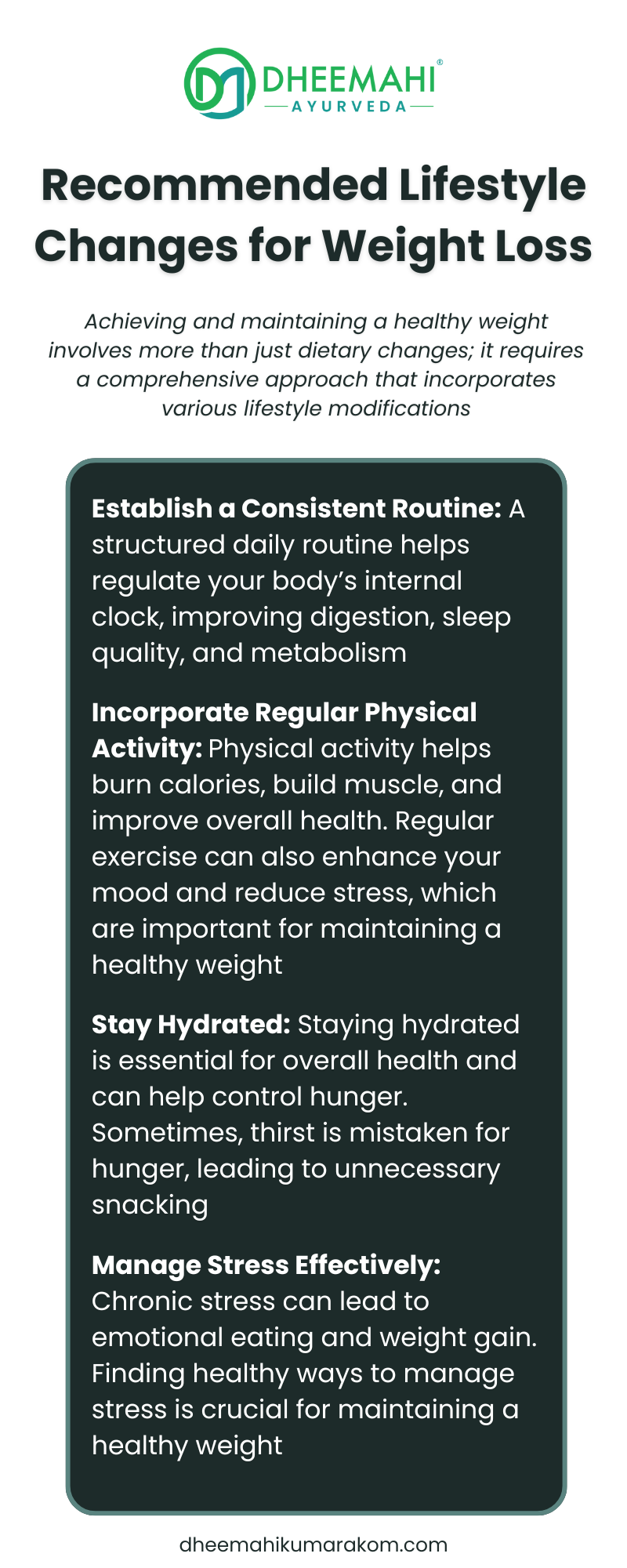Recommended Diet and Lifestyle Changes for Weight Loss from Ayurveda
Dr. Amritha
Weight loss journey often requires thoughtful adjustments to one’s dietary habits. While exercise is essential, the foods we consume are pivotal in determining our overall health and weight. Making strategic diet changes can facilitate weight loss, improve energy levels, enhance mood, and support long-term well-being.
By focusing on nutrient-dense whole foods, practising portion control, and adopting mindful eating habits, individuals can create a sustainable approach to weight management. Ayurveda offers a holistic approach to weight loss that emphasizes balancing the body, mind, and spirit. This ancient system tailors weight loss strategies to each individual’s constitution (or dosha), offering personalized guidance on food choices, lifestyle practices, and stress management.
With Ayurvedic weight loss treatment in Kerala, individuals can achieve sustainable weight loss while promoting overall well-being. This approach not only addresses physical aspects but also enhances mental clarity and emotional stability. By understanding one’s dosha and incorporating specific Ayurvedic dietary practices and lifestyle changes, people can embark on a balanced weight loss journey that nurtures both body and mind.
Recommended Diet Changes for Weight Loss
Favour Whole, Natural Foods
Whole foods are minimally processed and rich in nutrients, making them more satisfying and beneficial for the body.
Recommended Changes:
- Fresh Fruits and Vegetables: Incorporate a variety of seasonal produce, which is high in fibre, vitamins, and minerals. For Kapha types, choose lighter, bitter greens, while Pitta types can enjoy cooling vegetables like cucumbers.
- Whole Grains: Opt for whole grains such as brown rice and barley, which provide complex carbohydrates and fibre that aid digestion and keep you full longer.
Emphasize Warm, Cooked Meals
Warm, cooked foods are easier to digest and help maintain digestive fire (Agni), which is crucial for effective metabolism.
Recommended Changes:
- Soups and Stews: Incorporate warming soups and stews into your diet. They are nourishing and can be easily customized with various vegetables and spices.
- Steamed or Roasted Vegetables: Cooked vegetables are preferred over raw vegetables, especially for Vata and Kapha types, as they are easier to digest.
Use Spices to Enhance Metabolism
Spices add flavour, stimulate digestion, and boost metabolism, making them essential for weight loss.
Recommended Changes:
- Incorporate Digestive Spices: Use spices like ginger, turmeric, cumin, and black pepper in your meals. These spices aid digestion and help regulate appetite.
Control Portion Sizes Mindfully
Understanding portion sizes helps prevent overeating and fosters a healthier relationship with food.
Recommended Changes:
- Mindful Eating: Pay attention to hunger and fullness cues, and eat slowly to enjoy each bite thoroughly.
- Smaller Plates: Serve food on smaller plates to naturally limit portion sizes and reduce the likelihood of overeating.
Increase Protein Intake
Protein is vital for muscle repair and can help keep you feeling full longer, aiding in weight management.
Recommended Changes:
- Lean Proteins: Include sources such as lentils, beans, and low-fat dairy in your meals.
- Snacks: Choose protein-rich snacks, such as nuts, seeds, or yoghurt, to help curb hunger between meals.
Stay Hydrated with Warm Liquids
Adequate hydration is crucial for metabolism and can help prevent overeating, as thirst can sometimes be mistaken for hunger.
Recommended Changes:
- Drink Warm Water: Aim to drink warm or room-temperature water throughout the day to support digestion and eliminate toxins.
Avoid Heavy and Processed Foods
Heavy, processed foods can lead to weight gain and sluggishness, disrupting the body’s natural balance.
Recommended Changes:
- Limit Sugary and Fried Foods: Reduce the intake of sweets, processed snacks, and fried items that contribute to empty calories.
- Focus on Fresh Ingredients: Prepare meals from scratch using fresh, whole ingredients to ensure better quality and nutrition.
Establish a Daily Routine
A consistent routine helps regulate the body’s internal clock, promoting better digestion and metabolism.
Recommended Changes:
- Regular Meal Times: Eat meals daily to help your body anticipate and optimize digestion.
- Adequate Sleep: Prioritize quality sleep, as inadequate rest can disrupt hormones related to hunger and appetite.

Recommended Lifestyle Changes for Weight Loss
Achieving and maintaining a healthy weight involves more than just dietary changes; it requires a comprehensive approach that incorporates various lifestyle modifications. These changes can enhance your weight loss efforts, improve your overall health, and foster a sustainable, healthy lifestyle.
Establish a Consistent Routine
A structured daily routine helps regulate your body’s internal clock, improving digestion, sleep quality, and metabolism.
Recommended Changes:
- Regular Meal Times: Try to eat your meals at the same time each day. This consistency can help regulate your body’s hunger signals and prevent late-night snacking.
- Sleep Schedule: Aim for 7-9 hours of quality sleep each night. Establish a bedtime routine to signal to your body that it’s time to wind down.
Incorporate Regular Physical Activity
Physical activity helps burn calories, build muscle, and improve overall health. Regular exercise can also enhance your mood and reduce stress, which are important for maintaining a healthy weight.
Recommended Changes:
- Aim Moderate Exercise: Strive for moderate weekly aerobic activity, such as brisk walking, cycling, or swimming.
- Include Strength Training: Incorporate strength training exercises at least two days a week to build muscle, which can increase your resting metabolic rate.
Practice Mindful Eating
Mindful eating encourages a greater awareness of food choices, portion sizes, and eating habits, which can prevent overeating and emotional eating.
Recommended Changes:
- Eliminate Distractions: Avoid watching TV or using your phone while eating. Focus on your meal to enhance enjoyment and satisfaction.
- Chew Slowly: Take time to chew each bite thoroughly, aiding digestion and giving your brain time to signal when you’re full.
Stay Hydrated
Staying hydrated is essential for overall health and can help control hunger. Sometimes, thirst is mistaken for hunger, leading to unnecessary snacking.
Recommended Changes:
- Drink Plenty of Water: Keep a water bottle with you to make it easier to stay hydrated.
- Limit Sugary Beverages: Reduce or eliminate high-calorie drinks like soda, sweetened teas, and alcohol, which can contribute significantly to calorie intake.
Manage Stress Effectively
Chronic stress can lead to emotional eating and weight gain. Finding healthy ways to manage stress is crucial for maintaining a healthy weight.
Recommended Changes:
- Practice Relaxation Techniques: To reduce stress, incorporate activities like yoga, meditation, or deep-breathing exercises into your daily routine.
- Engage in Hobbies: Spend time on activities that bring you joy, such as painting, gardening, or playing a musical instrument. This can help shift your focus away from food.
Set Realistic Goals
Setting achievable and specific goals can provide motivation and a clear roadmap for your weight loss journey.
Recommended Changes:
- Break Down Goals: Instead of aiming for a large weight loss goal, set smaller, more manageable targets.
- Track Progress: Keep a journal or use apps to track your food intake, exercise, and progress. This can help you stay accountable and make necessary adjustments.
Limit Screen Time
Excessive screen time, especially while eating, can lead to mindless eating and increased sedentary behavior.
Recommended Changes:
- Set Screen Time Limits: Aim to reduce recreational screen time to less than two hours a day. Instead, engage in more physical activities or hobbies.
- Designate Tech-Free Meals: Make mealtimes tech-free zones to focus on enjoying your food and connecting with others.
Ayurvedic weight loss treatment in kerala at Dheemahi
Dheemahi offers traditional Ayurvedic therapies and treatments that emphasize restoring balance in the body and mind.
Consultation and Dosha Assessment:
Personalized Evaluation: Experienced Ayurvedic practitioners at Dheemahi conduct thorough consultations to assess your dosha constitution, current health status, and weight loss goals.
Customized Treatment Plan: Based on the assessment, a personalized treatment plan is devised, incorporating specific dietary recommendations, herbal supplements, and therapeutic practices tailored to your needs.
Panchakarma Therapy:
Detoxification and Cleansing: Panchakarma, a cornerstone of Ayurvedic therapy, includes procedures such as Virechana (purgation), Nasya (nasal cleansing), and Vasti, especially Lekhana Vasti. These procedures and other external treatments help eliminate toxins (ama) and restore dosha balance. This promotes optimal digestion and metabolic function, essential for weight loss.
Therapeutic Treatments:
Abhyanga (Ayurvedic Massage)
Abhyanga involves applying warm herbal oils to the body through a specific massage technique. This treatment helps to stimulate circulation, enhance metabolism, and promote relaxation.
Benefits for Weight Loss:
- Increases Circulation: Improved blood flow can enhance metabolic activity.
- Reduces Stress: The calming effects can help manage emotional eating and reduce cortisol levels.
- Detoxification: Helps eliminate toxins (ama) from the body, supporting weight loss.
Udvartana (Herbal Powder Massage)
Udvartana is a special type of massage that uses herbal powders, often mixed with oils, to exfoliate the skin and stimulate metabolism.
Benefits for Weight Loss:
- Promotes Fat Burning: The friction created during the massage can help break down fat deposits.
- Improves Skin Tone: Enhances circulation and lymphatic drainage, leading to healthier skin.
- Increases Agni (Digestive Fire): Stimulates digestion, which can help reduce weight.
Vasti (Medicated Enema)
Vasti is a treatment that involves administering herbal decoctions or oils through the rectum. It is one of the five detoxification procedures in Panchakarma.
Benefits for Weight Loss:
- Cleanses the Colon: Helps remove accumulated toxins from the digestive tract.
- Balances Doshas: Particularly effective for balancing Kapha dosha, which is associated with weight gain.
- Enhances Digestion: Improves overall digestive health, crucial for weight management.
Swedana (Herbal Steam Therapy)
Swedana involves the application of herbal steam to the body, which helps open the pores and promote sweating.
Benefits for Weight Loss:
- Promotes Detoxification: Sweating helps eliminate toxins and impurities from the body.
- Increases Metabolism: The heat can help increase metabolic rate and promote fat loss.
- Relieves Stress: The relaxing effect of steam therapy can reduce stress levels and improve overall well-being.
Shirodhara
Shirodhara is a calming Ayurvedic treatment that involves gently pouring medicine over the forehead.
Benefits for Weight Loss:
- Reduces Stress: Helps calm the mind and minimises stress-related eating habits.
- Enhances Sleep Quality: Promotes better sleep, essential for weight loss and overall health.
- Balances the Mind: Improves mental clarity and emotional balance, helping to combat cravings.
Ayurvedic Diet and Nutrition:
Dosha-Specific Diet: Tailored dietary guidelines emphasize whole, nutrient-dense foods that support digestion and metabolism according to your dosha type (Vata, Pitta, or Kapha).
Herbal Supplements: Prescribed herbal formulations aid detoxification, improve digestion, and support weight management efforts.
Lifestyle Recommendations:
Daily Routine (Dinacharya): This section provides guidance on establishing a daily routine that includes optimal meal times, adequate rest, and stress management techniques.
Physical Activity: Recommendations for suitable exercises complementing your dosha constitution to promote fitness and overall well-being.
Yoga and Meditation: Practices tailored to your dosha type are incorporated to reduce stress, enhance mindfulness, and support emotional balance—crucial aspects of sustainable weight loss.
Conclusion
Dheemahi Ayurveda is dedicated to prioritizing patient health and well-being through a rich tradition of Ayurvedic wisdom passed down through five generations. Our team comprises expert doctors who are committed to your health journey.
Routine follow-up check-ups are also an essential requirement for chronic diseases. In the case of therapies needed to relieve symptoms, a doctor’s supervision is necessary. At Dheemahi Ayurveda, we believe in providing you with the utmost reliability.
Our daily consultations, backed by thorough and comprehensive physical examinations, ensure that our doctors have a deep understanding of your condition, instilling trust and confidence in our services.
How Our Booking Process Works
The unique approach involves a series of discussion during your initial decision-making process to make sure that we will be able to match your expectations with our treatment.
Based on the discussions with you our team of expert doctors will design the best treatment package personalized for your needs.
01
Consultation Form
Fill out our consultation form, and let us know when will you be available for our doctor to talk to you
02
Discussion with Doctor
Discuss your health condition and expectations with our doctor.
03
Booking Confirmation
Confirm the booking by making a payment of 50% advance.
Consultation Form
Submit this form to initiate a booking with us
Have any queries? We will help you. Talk to us now
Say Goodbye to Health Woes & Hello to Healthy Living
Dheemahi Ayurvedic Pvt Ltd
12/386 Varaputhara Road
Kumarakom, Kerala, India
Pin 686563
Dheemahi Ayurvedic Centre, Near Neelimangalam Bridge, Kumaranaloor, Perumbaikad.P.O, Kottayam, Kerala, India, Pin 686016
Other Treatments
Karkidaka Chikilsa | Ayurvedic Treatment for Depression | How to Reduce Stress Naturally | Autoimmune Disorders | Mental Health Ayurvedic Treatment | Weight-Loss Treatment | Frozen Shoulder Ayurvedic Treatment | Diabetes Ayurvedic Treatment | PCOS Ayurvedic Treatment | Celiac Disease Treatment | ayurvedic treatment for skin diseases | nervous system ayurvedic treatment | Back Pain Ayurvedic Treatment | Cervical Spondylitis Ayurvedic Treatment | ayurvedic treatment for blood sugar | Fatty Liver Ayurvedic Treatment | Knee Pain Ayurvedic Treatment | Migraine Ayurvedic Treatment | Osteoarthritis Ayurvedic Treatment | Psoriasis Ayurvedic Treatment | Sinusitis Ayurvedic Treatment | Ayurvedic Detox Treatment | Migraine Ayurvedic Treatment | Ayurvedic Treatment for Rheumatoid Arthritis | Ayurvedic treatment for joint pain | Ayurvedic treatment for ulcerative colitis | Panchakarma Treatment |


